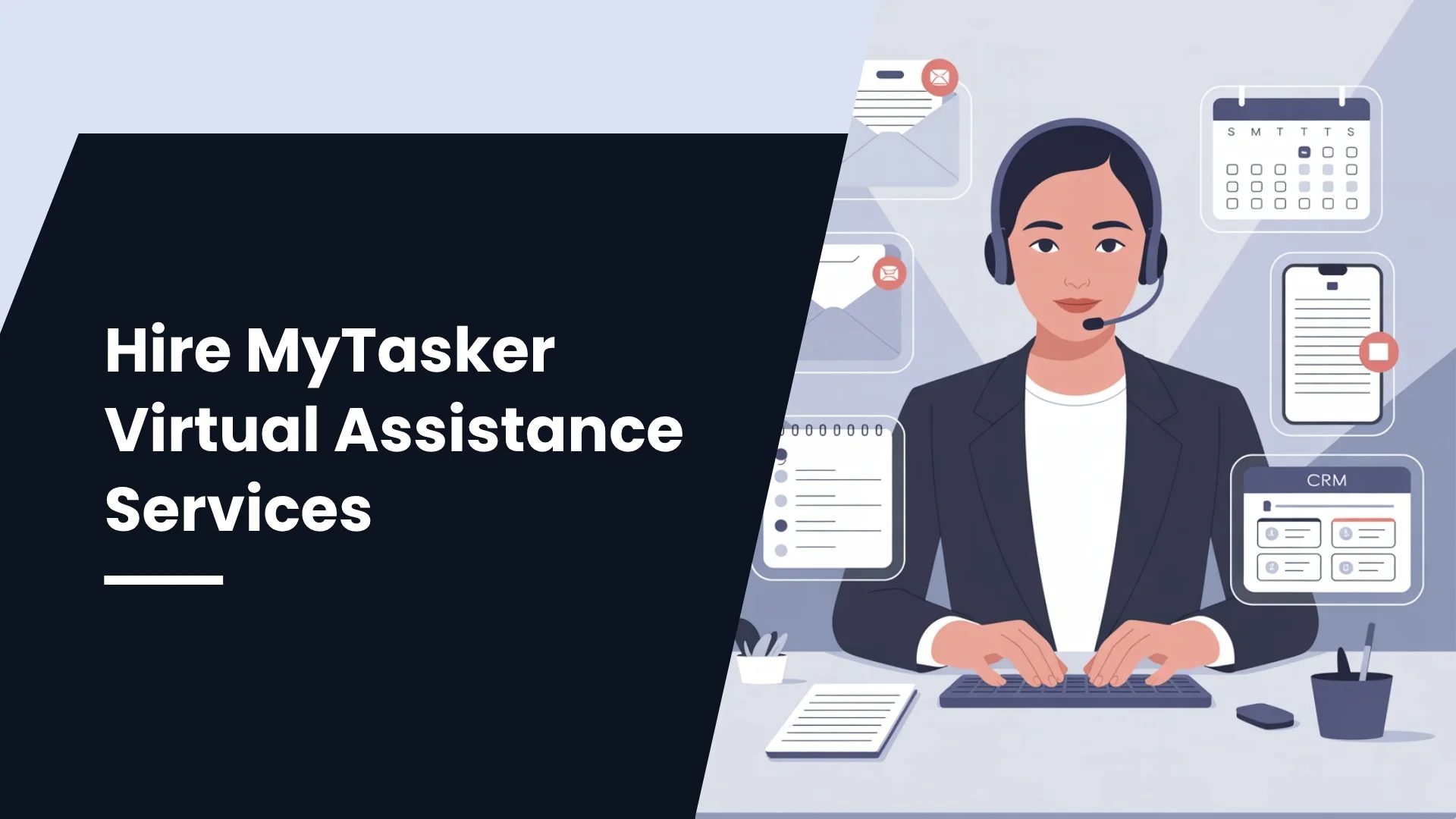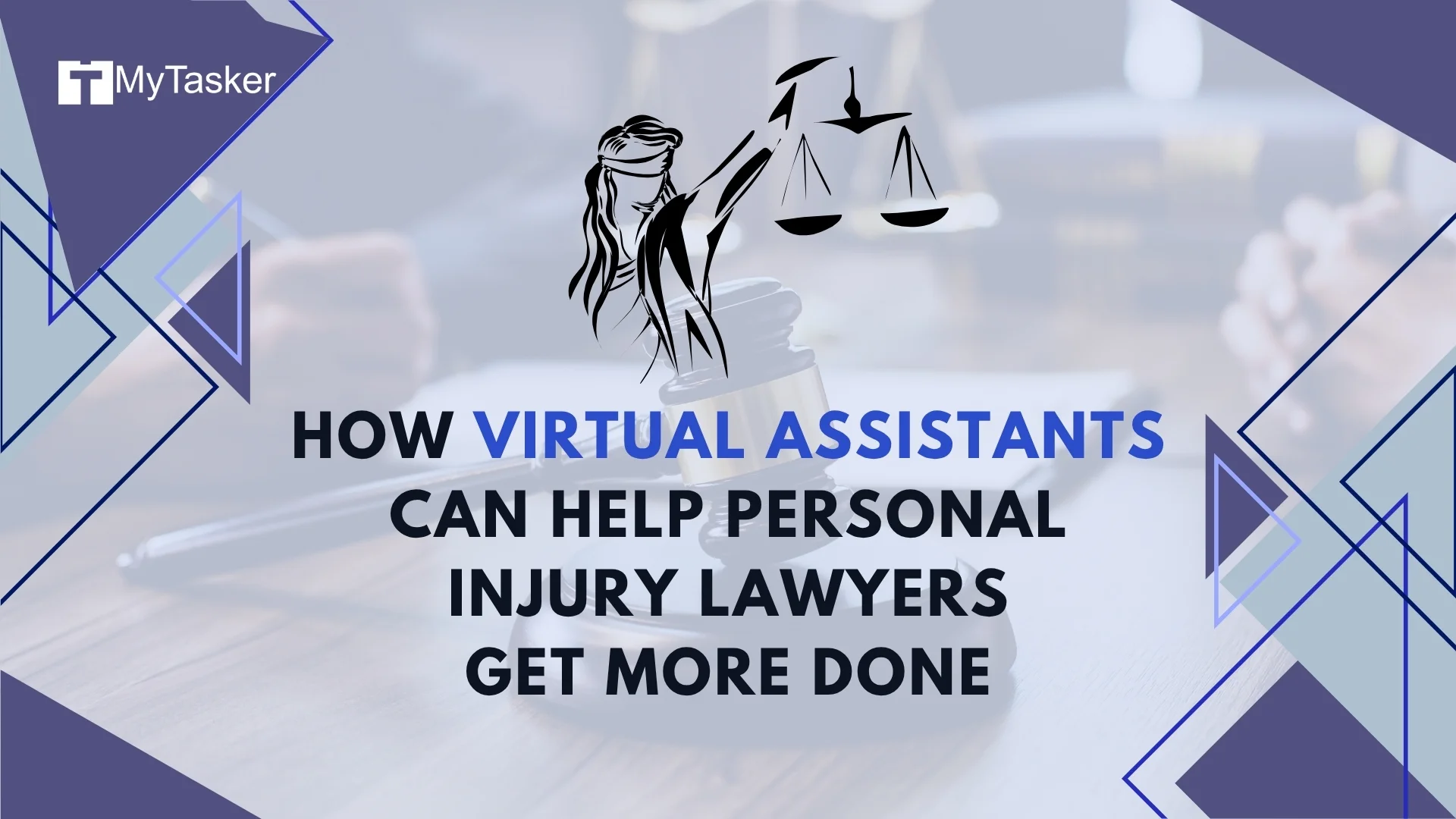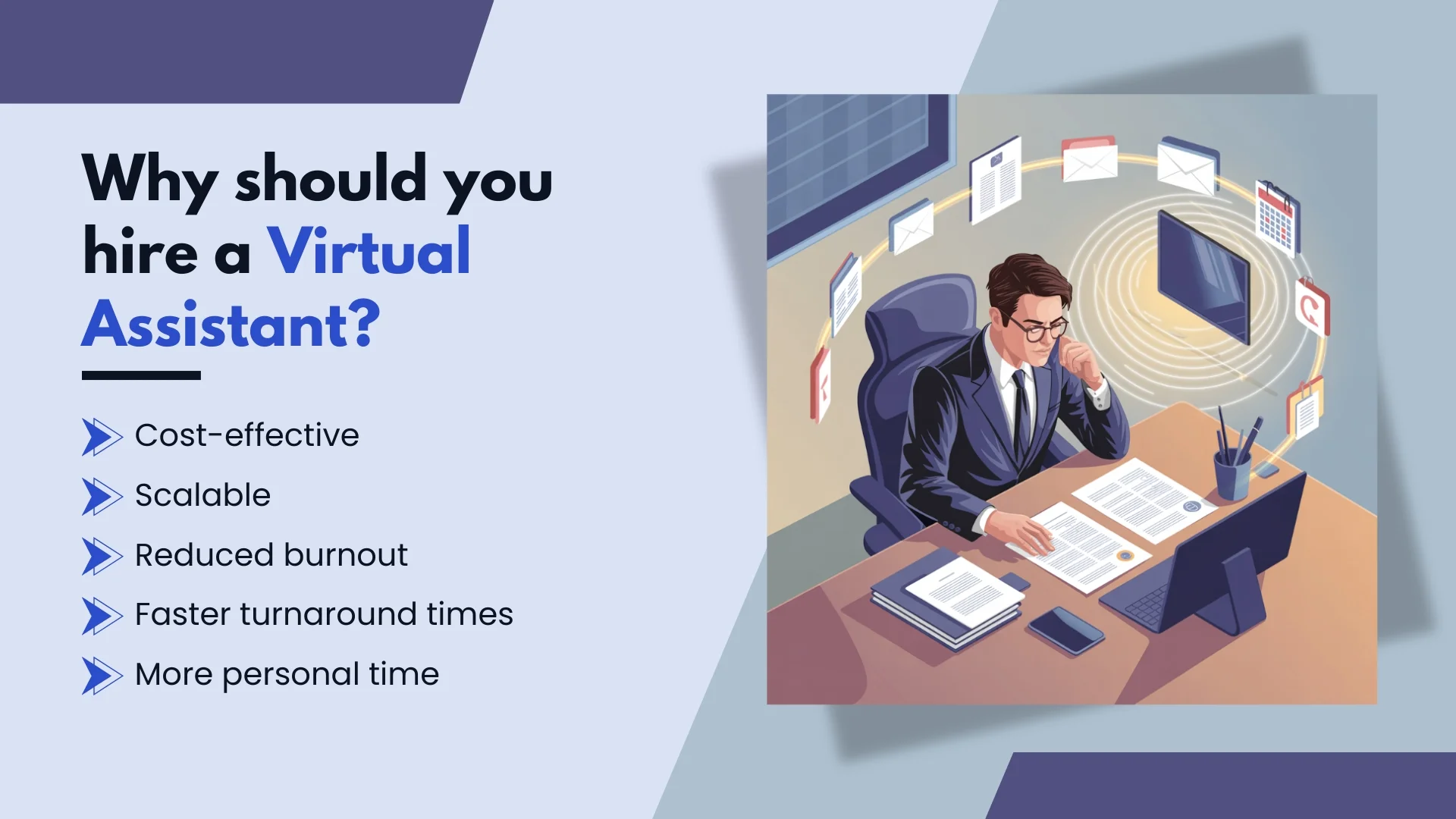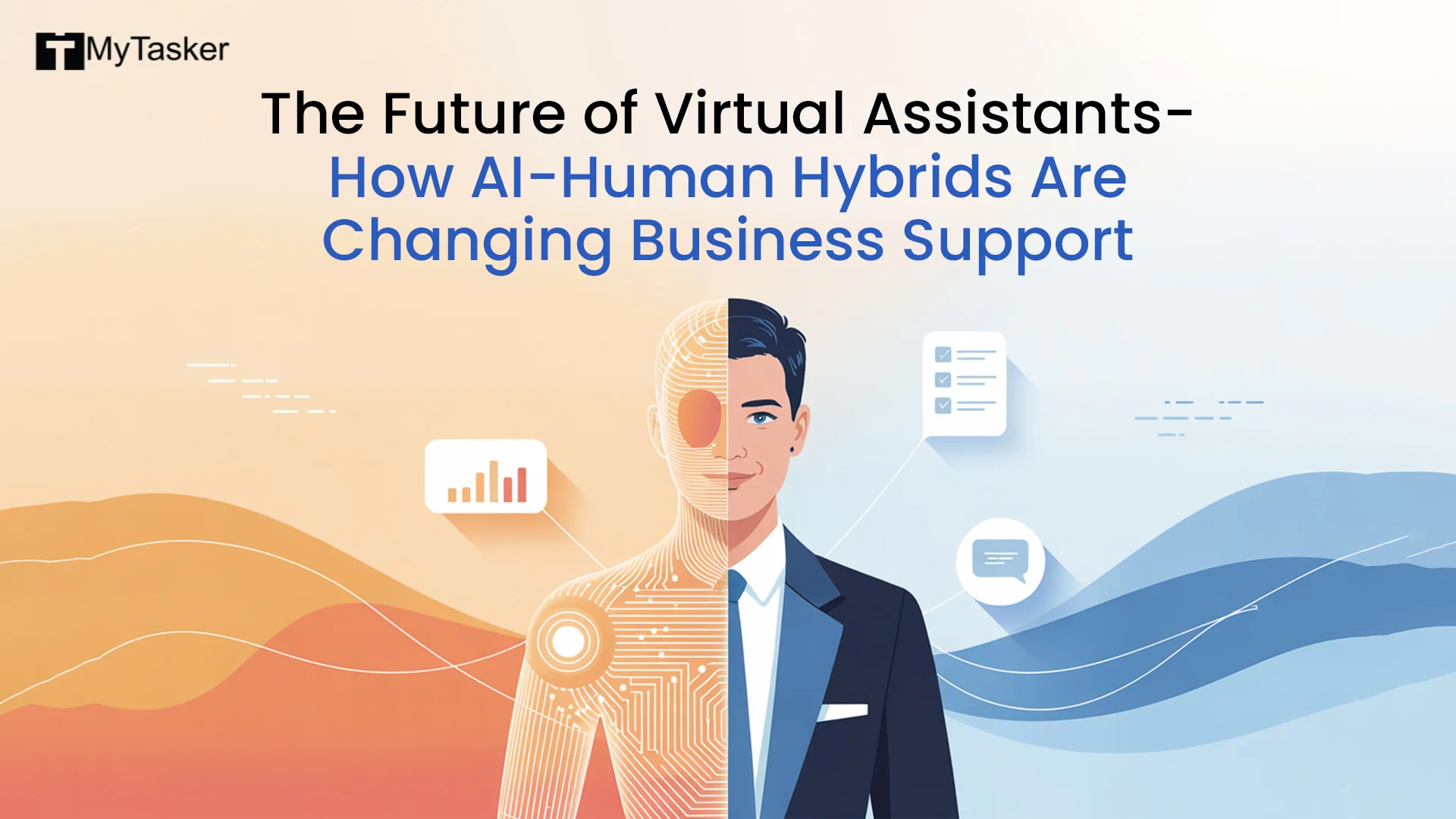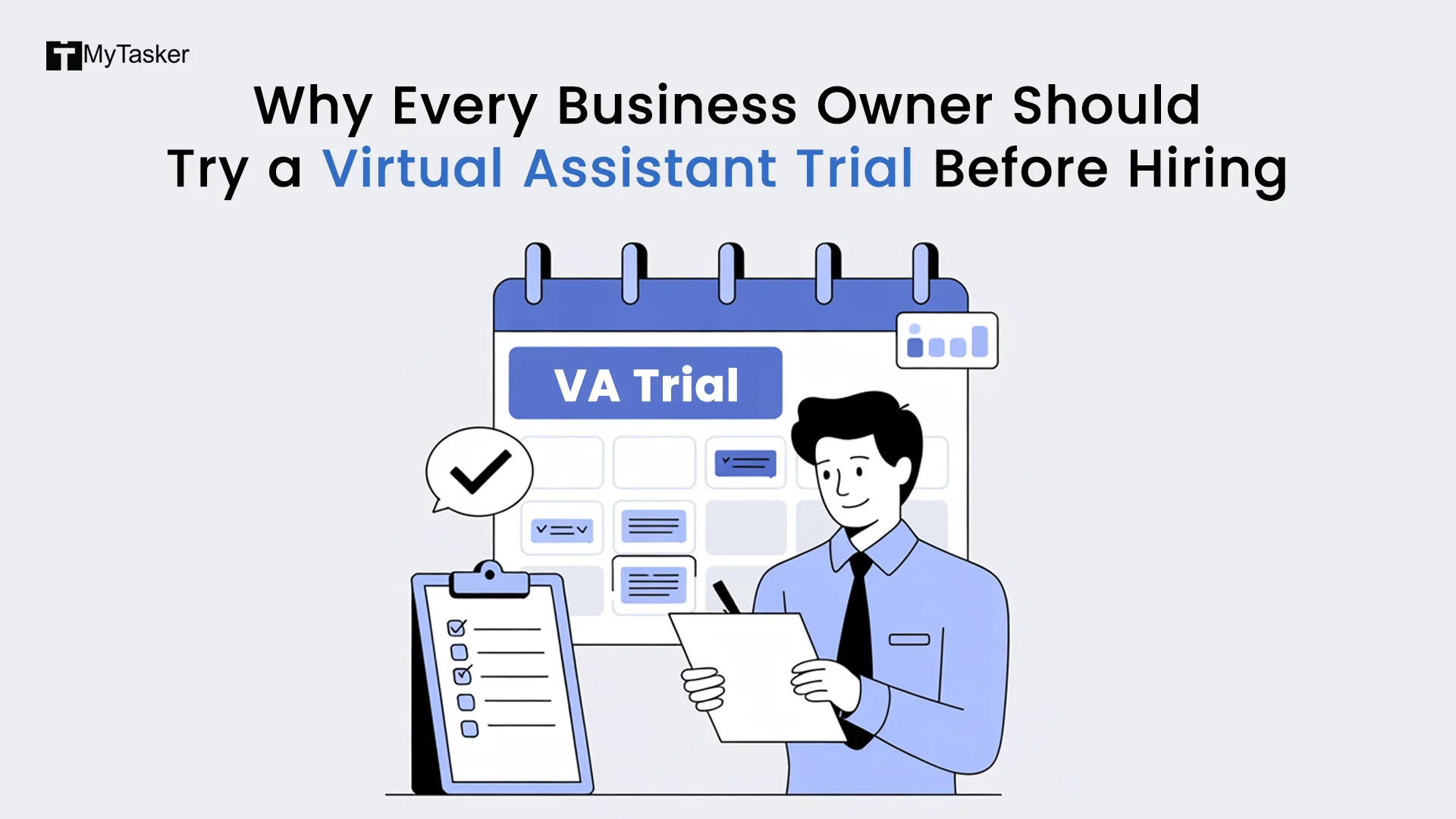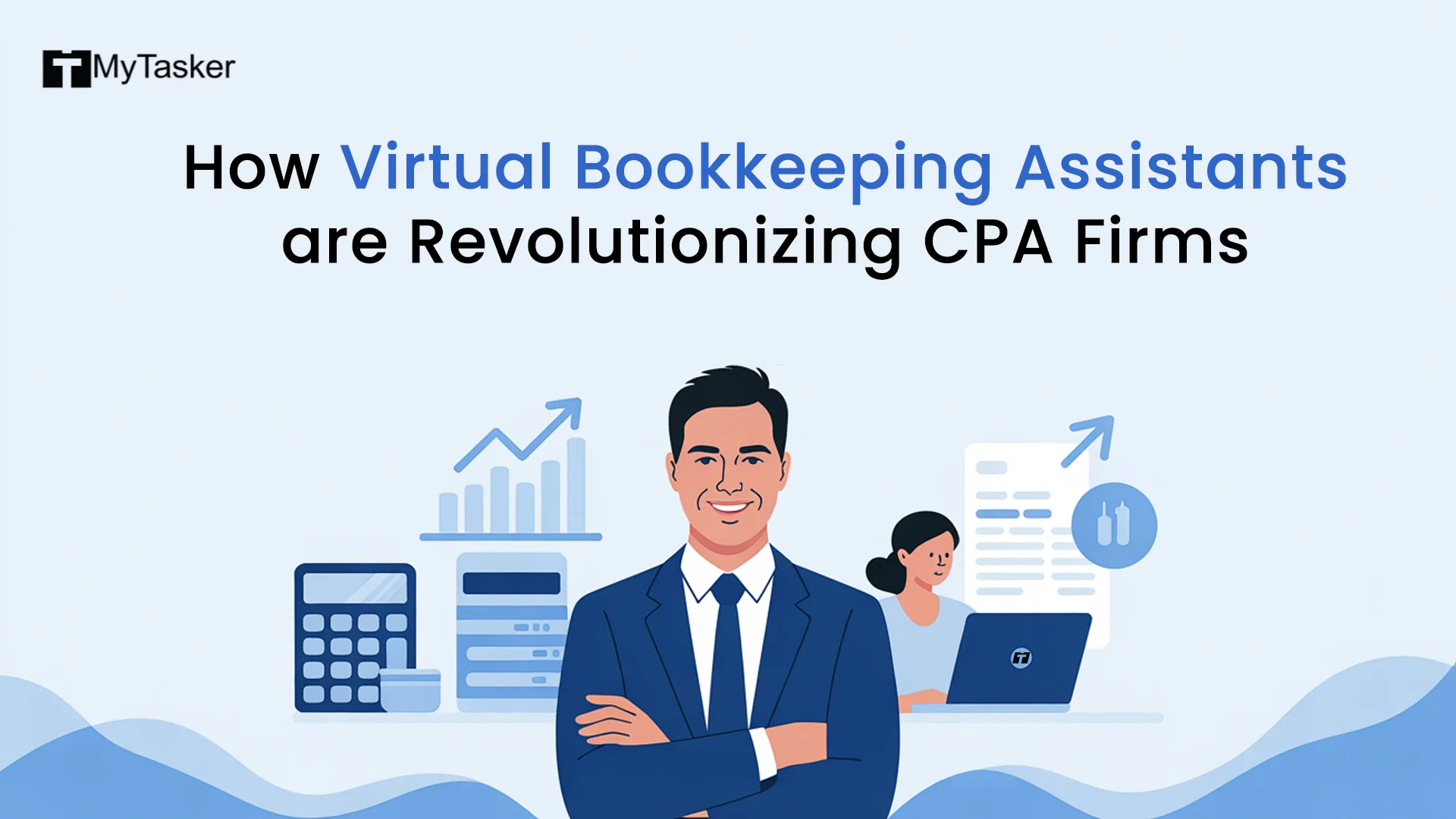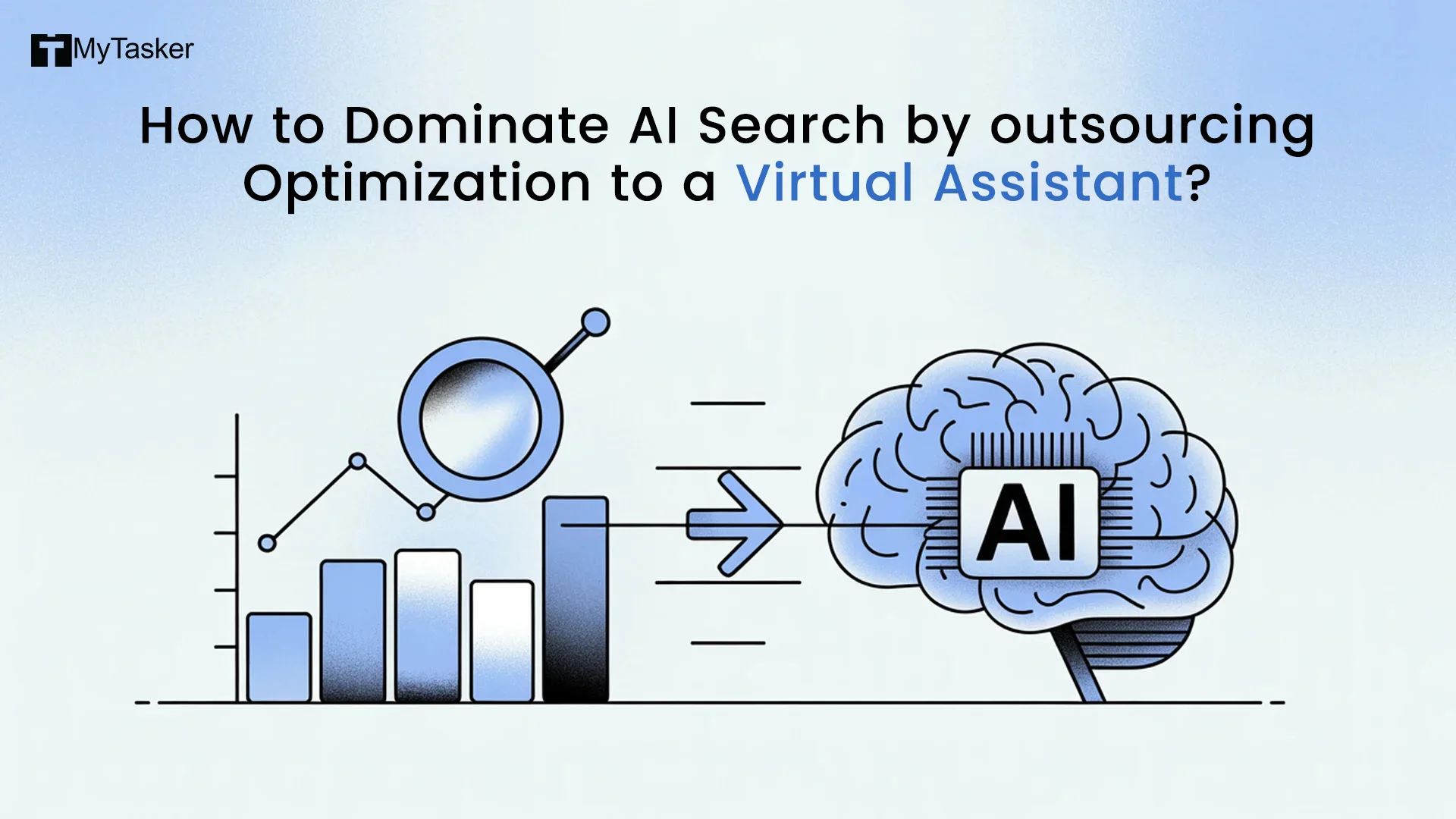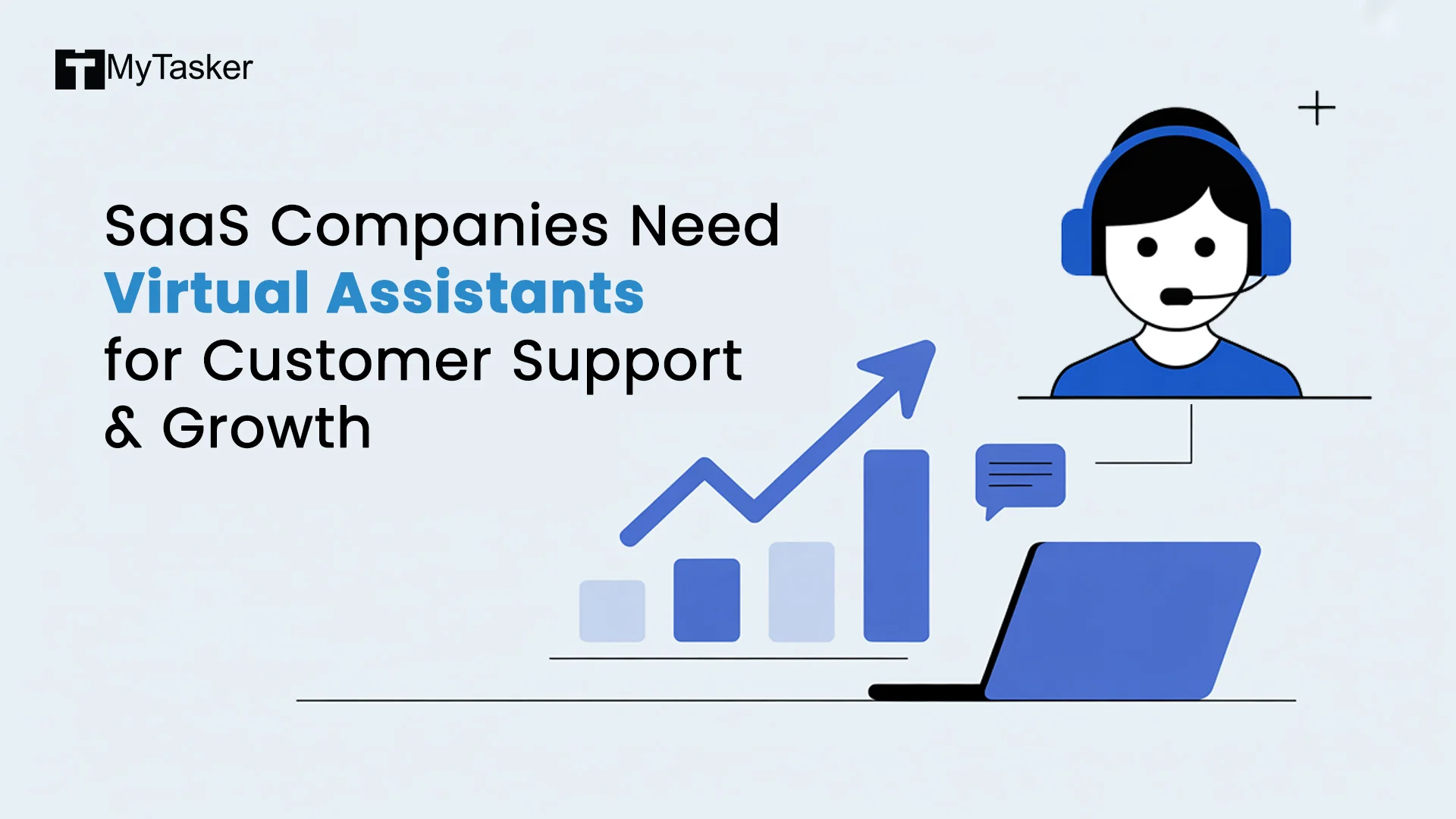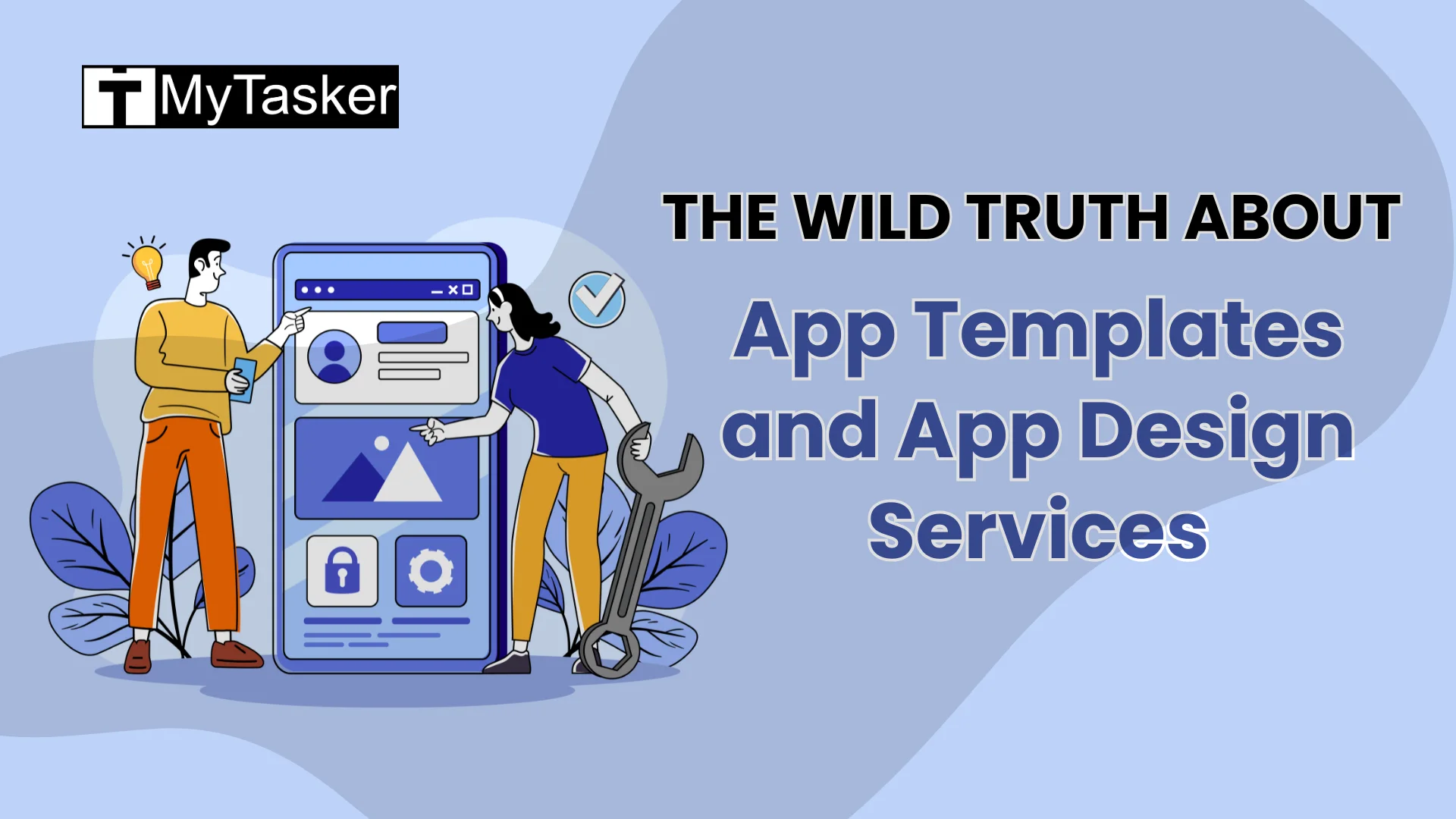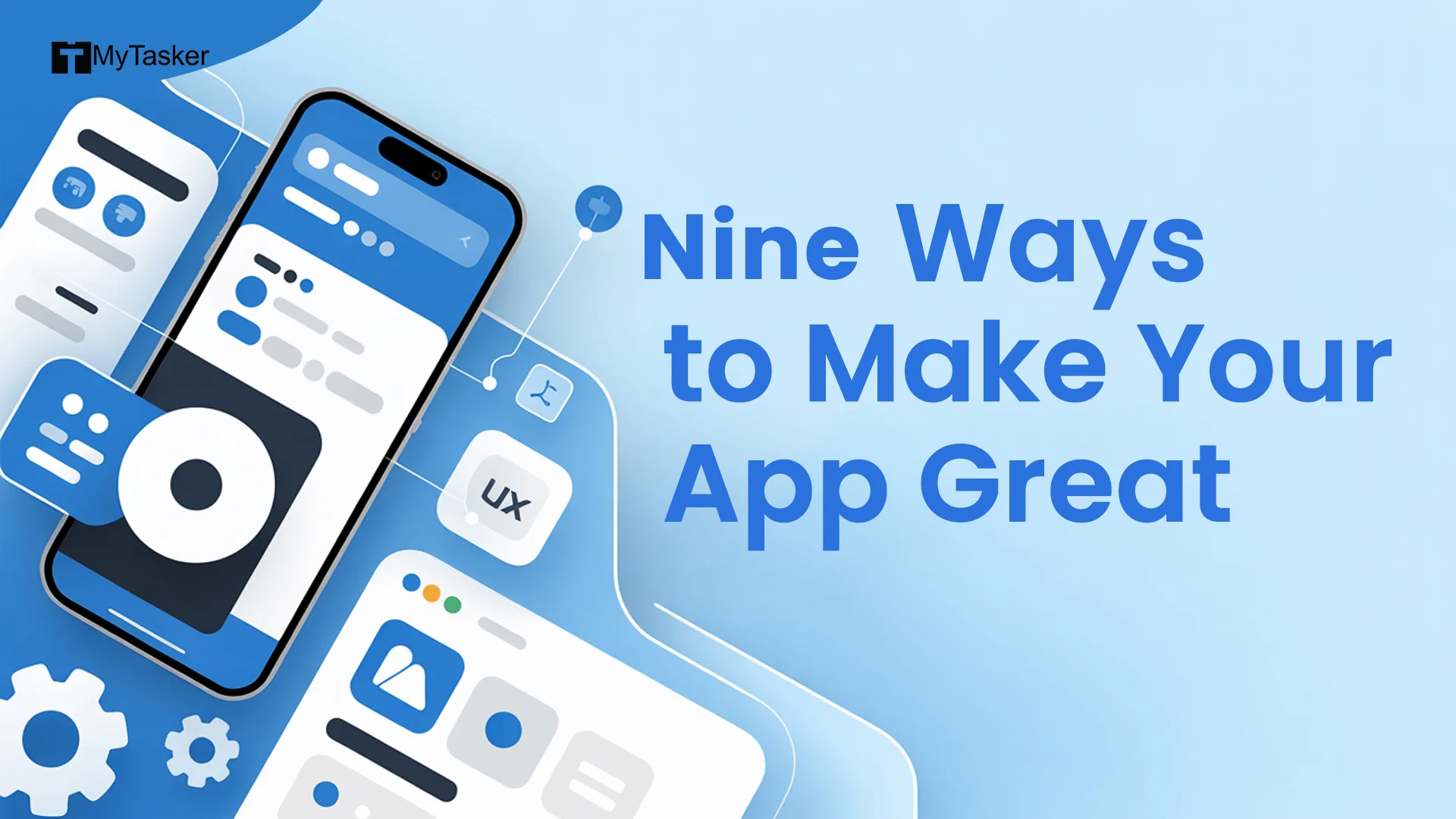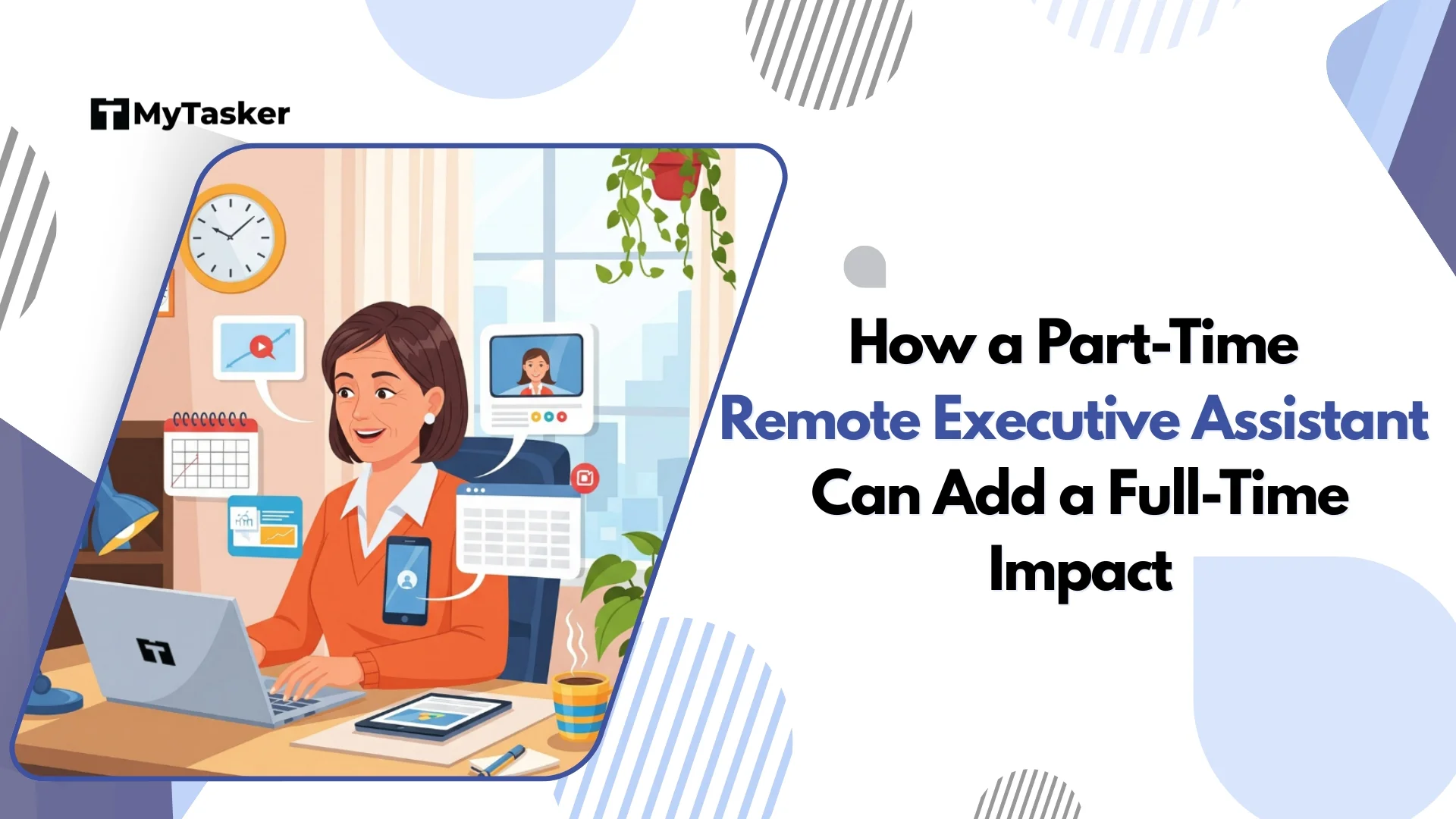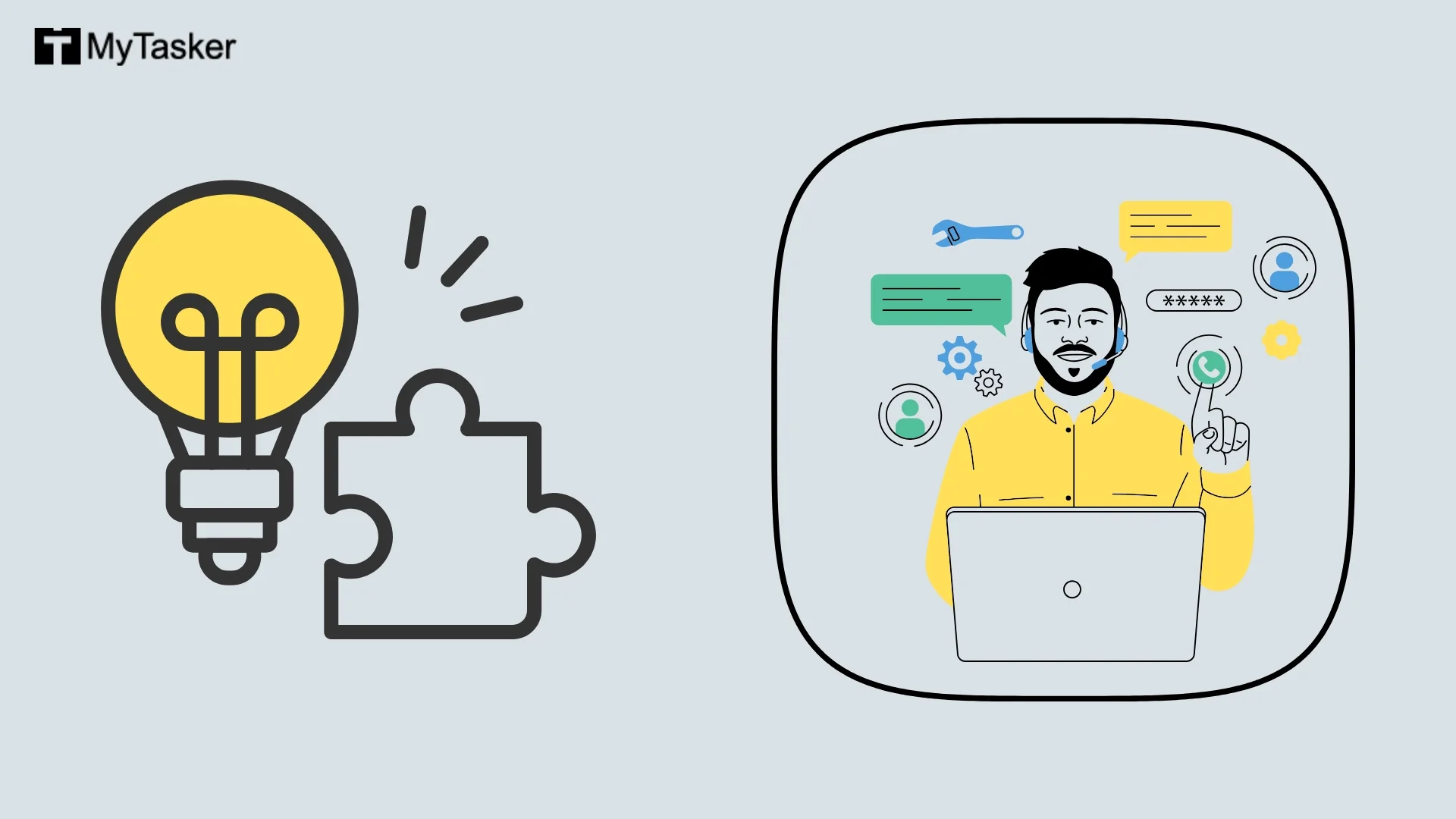The most critical aspects for law practitioners are precision, advocacy and trust. In the case of personal injury lawyers, the job schedule also includes tasks like interviewing clients, reviewing evidence, communicating with doctors and insurers and meeting non-negotiable court deadlines. These demands can pile up quickly and even the most organized lawyers can get overwhelmed and can’t focus on what they do best – practicing law and getting results.
As law firms grow – or just try to stay afloat in today’s competitive landscape – virtual assistants (VAs) are becoming an essential tool. They’re not just a cost-cutting measure or a temporary help. For personal injury practices, they’re a strategic shift in how work gets done.
In this article, we’ll explore the whole picture: the growing role of virtual assistants in personal injury law, how they support case management, when to bring one on board, how to hire the right VA and answers to the most common questions that law firm leaders ask before hiring.
The Evolving Role of Virtual Assistants in Law
A virtual assistant, in the legal context, is a remote professional – human or AI – who can support tasks that don’t require a lawyer’s license but are critical to the daily operations of a firm.
Think of them as a combination of an administrative assistant, paralegal and operations manager – however, they are not located within the confines of your office. Whether they’re handling client intake, drafting case summaries or organizing your digital files, virtual assistants are often trained in legal workflows and software platforms like Clio, PracticePanther or MyCase.
And they bring more than just convenience. For personal injury lawyers where case volume is high and documentation is vast, VAs offer a way to scale without burnout, grow without chaos and operate without drowning in overhead.
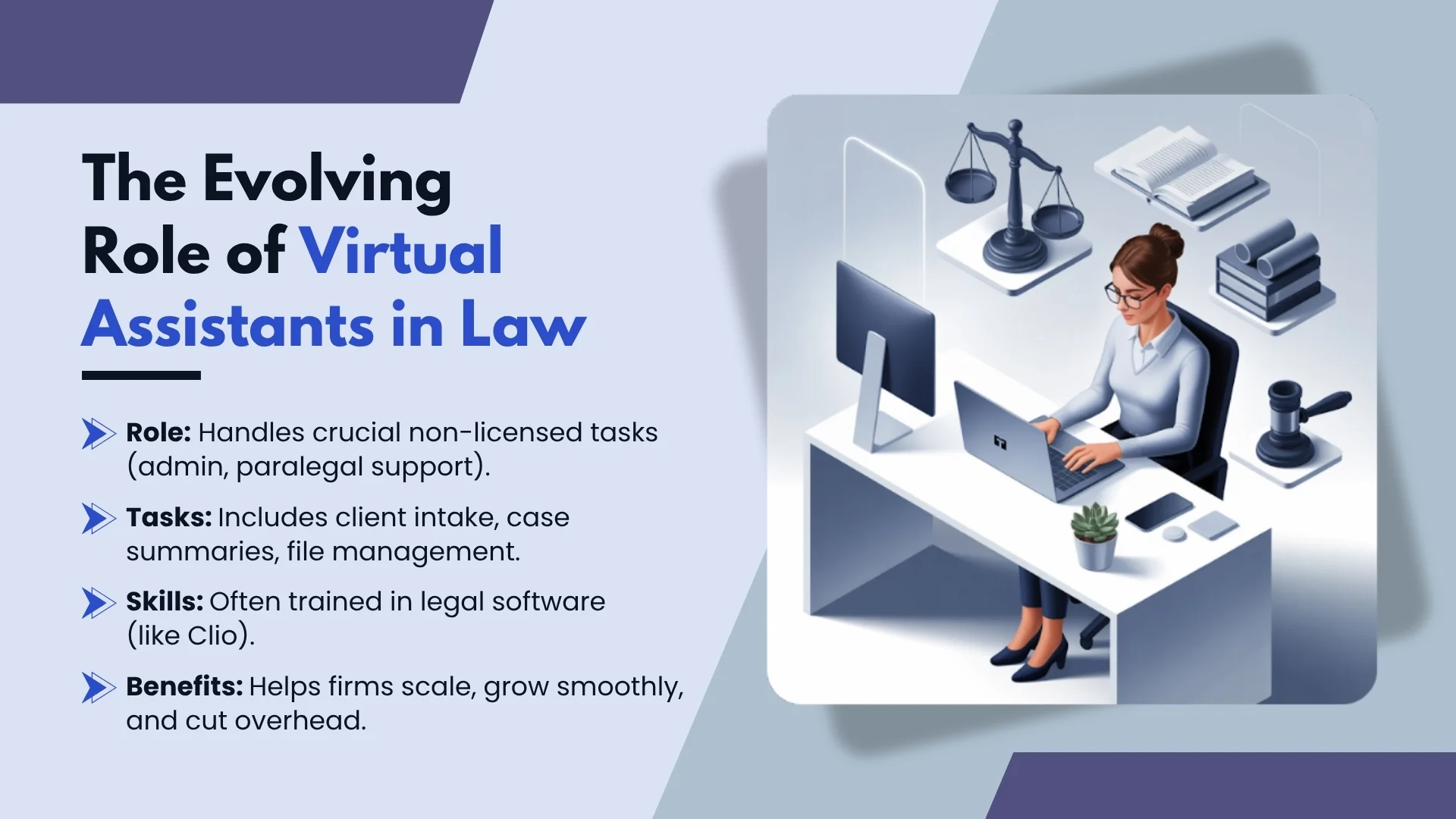
Why Personal Injury Law Is Perfect for Virtual Support
Unlike other areas of law that may rely heavily on courtroom appearances or contract negotiations, personal injury law is highly documentation- and communication-driven.
Here’s what that means in practice:
- Every case starts with client intake and fact-gathering.
- Progress depends on the timely collection of medical records, insurance documents and witness statements.
- Legal teams must stay on top of deadlines, statutes of limitations and case correspondence. Settlements and litigation prep require organization, research and client updates.
These tasks are critical – but not all require a licensed attorney. That’s where the VA fits in, as your operational backbone while you lead the legal charge.
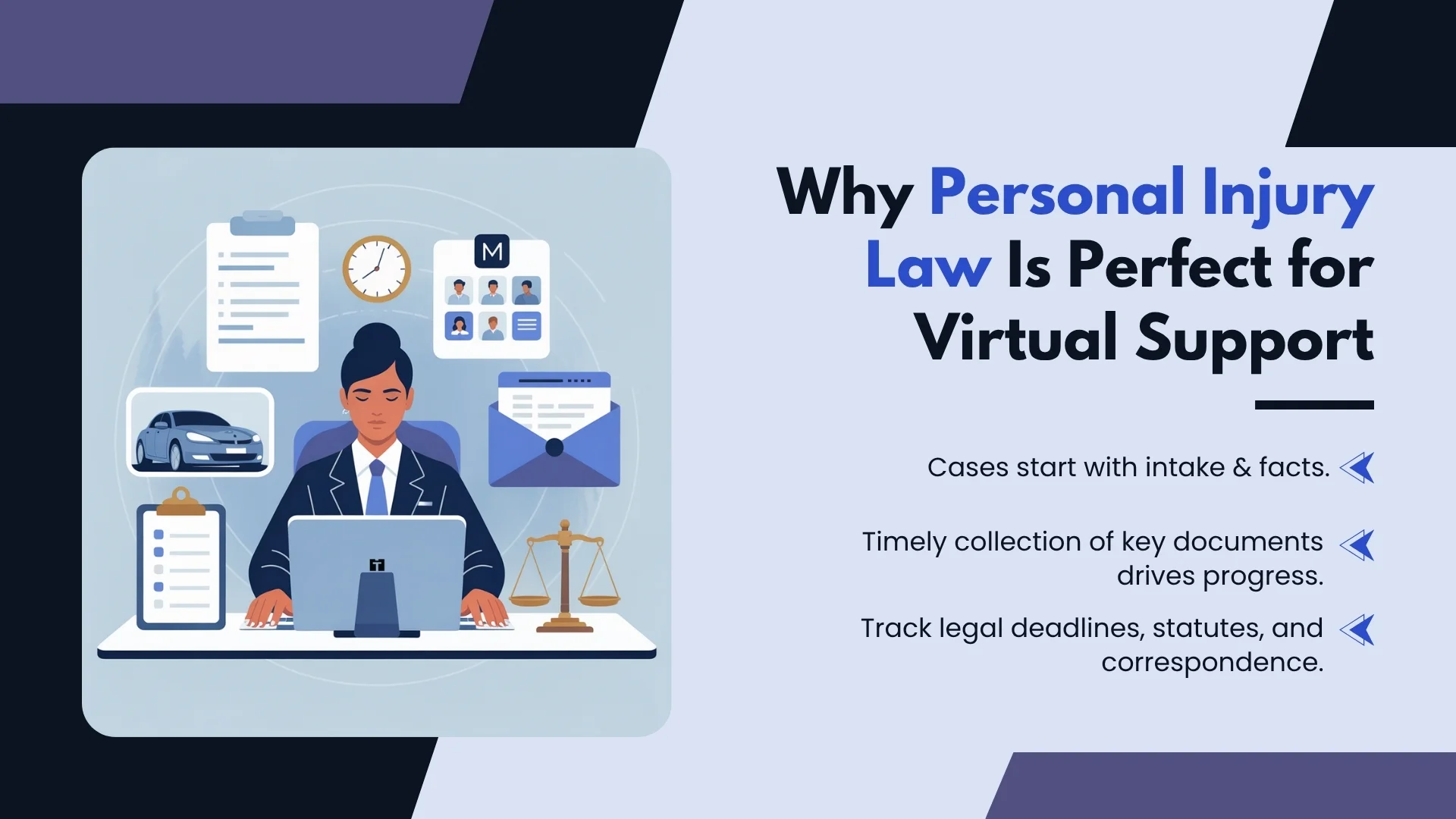
Key Areas Where Virtual Assistants Deliver Strategic Value
Client Intake: First Impressions Count
When someone contacts and seeks help from a personal injury lawyer, they’re often in pain, stressed and overwhelmed. How your firm handles that initial interaction can make or break trust.
Virtual assistants can:
- Respond instantly via email, chat or phone – day or night.
- Guide potential clients through structured intake forms.
- Qualify leads by reviewing police reports or accident descriptions before the attorney gets involved.
- Book consultations through tools like Calendly and make sure that no leads are ignored.
This ensures every lead is captured and your time is spent only on viable cases.
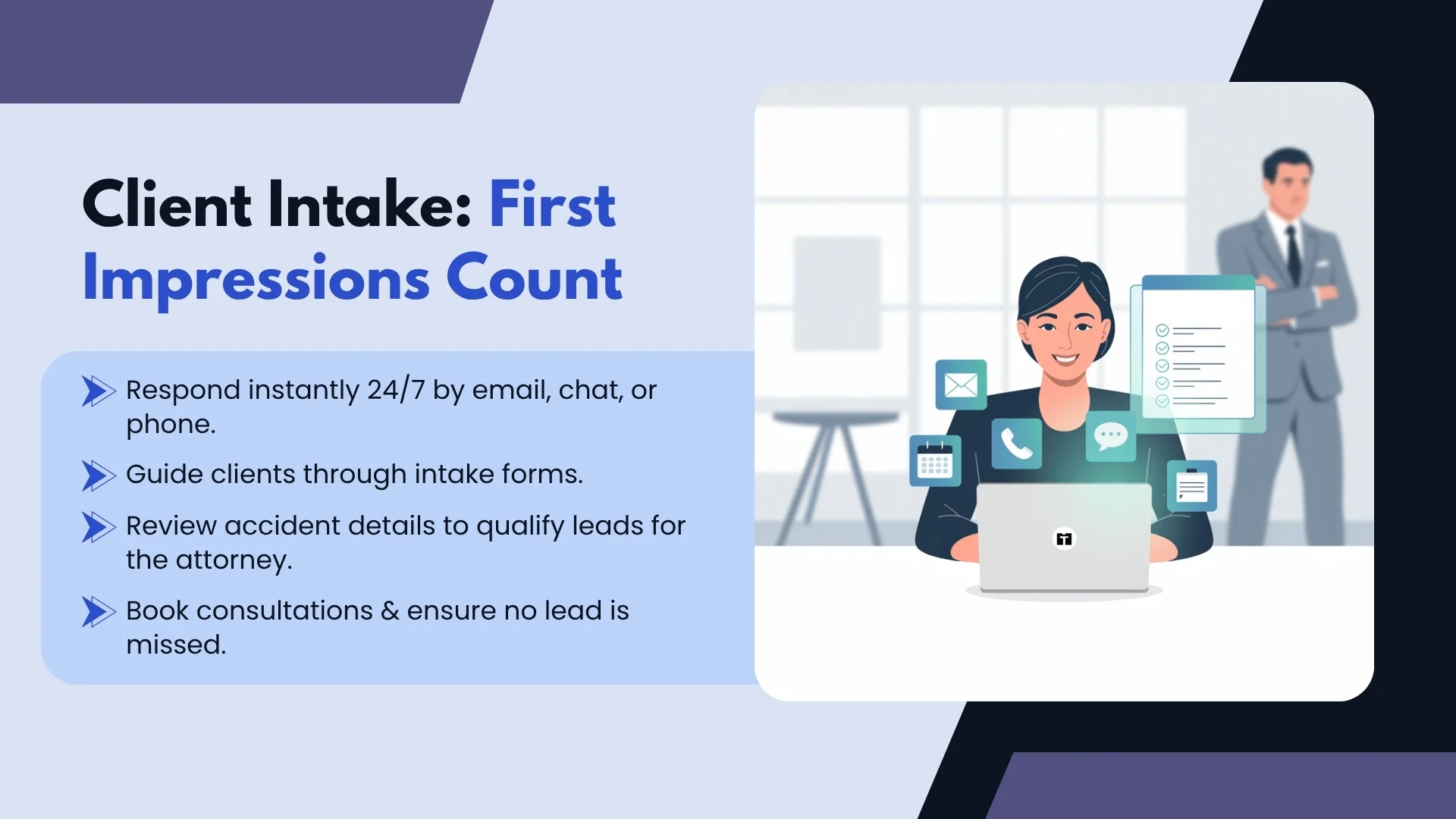
Document Management: Order from Chaos
Medical records, insurance letters, photographs, depositions – it adds up fast. A disorganized document system isn’t just inefficient; it can be harmful to the practice.
Virtual assistants can:
- Create and maintain a digital filing system using platforms like Dropbox, Google Drive or Clio.
- Apply uniform naming conventions so every document is easy to find.
- Scan and organize physical paperwork sent by clients.
- Set reminders for critical deadlines like discovery cutoffs or statute limitations.
As a result, you get instant access to every piece of your case without the stress of searching or double-handling.
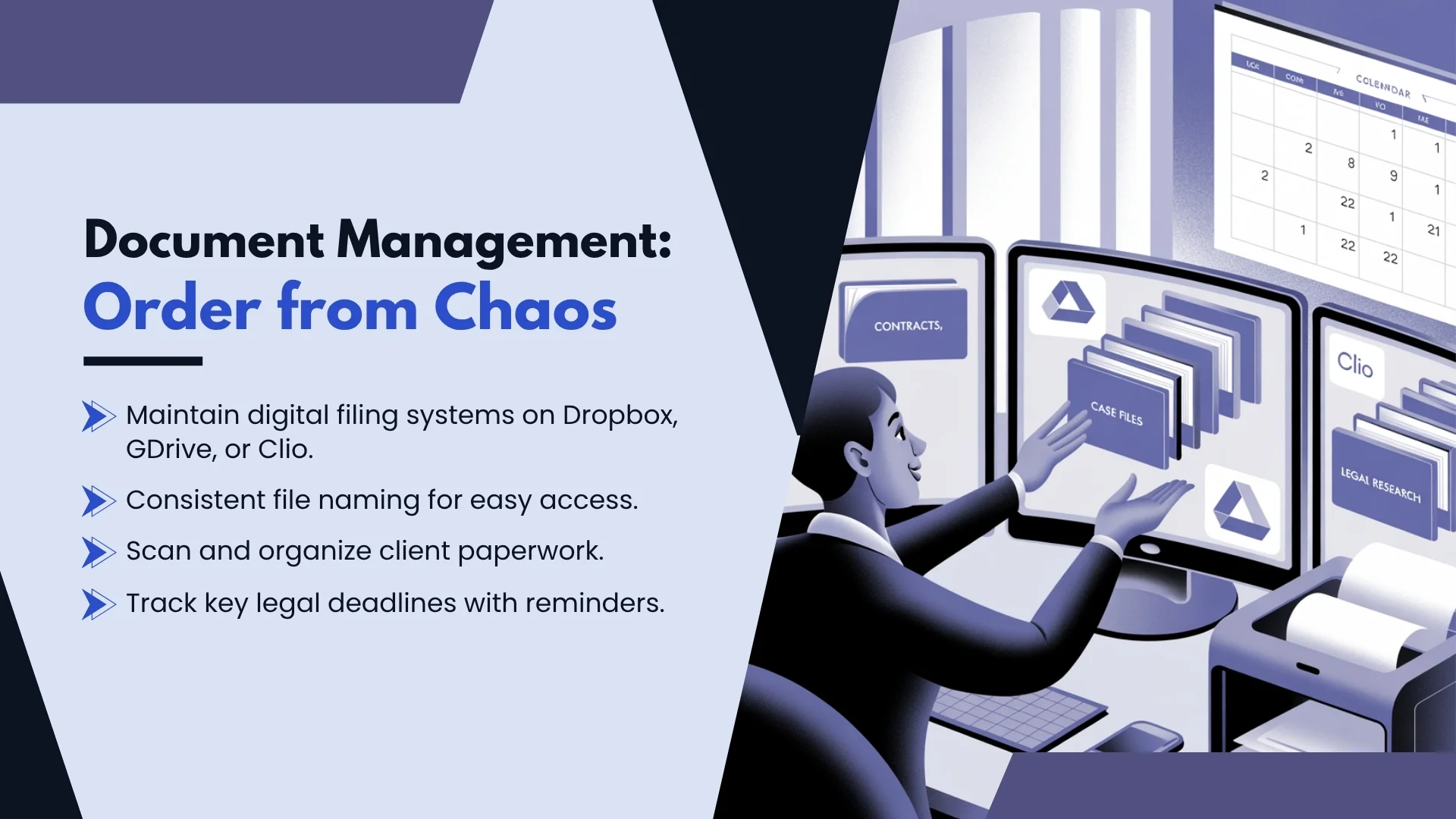
Client Communication: Consistency Builds Trust
One of the most common complaints clients have about lawyers is lack of communication. But staying in touch while managing dozens of files is no small feat.
Virtual assistants can:
- Draft update emails or call scripts to keep clients informed of progress.
- Filter your inbox and prioritize time-sensitive issues.
- Schedule appointments or send reminders.
- Maintain records of all communication for future reference and transparency.
By building regularity into your communication, you improve client satisfaction – and protect your reputation.
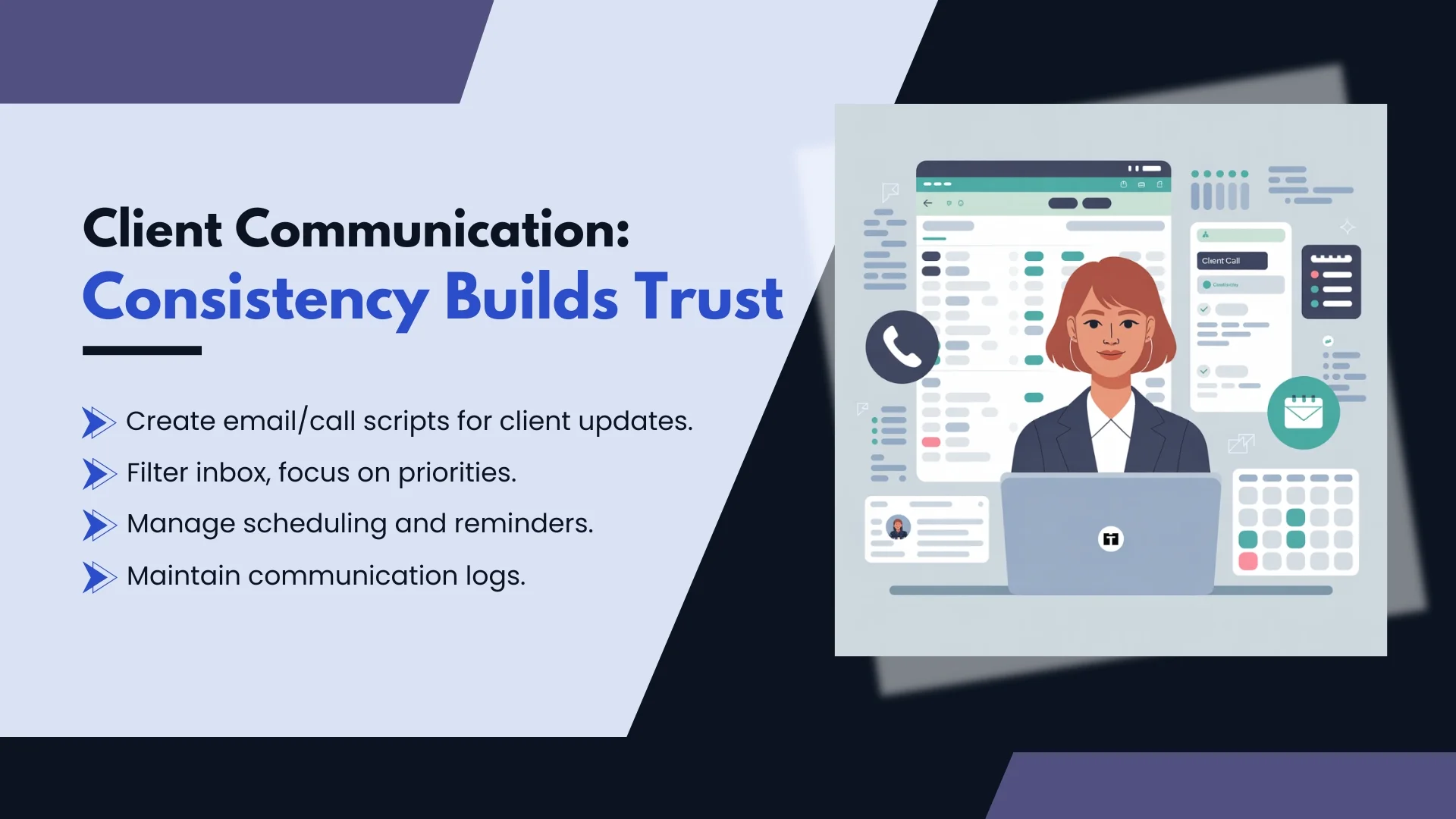
Legal Research and Drafting: Laying the Foundation
While VAs can’t sign pleadings or argue in court, they can support the legwork required for high-quality filings.
Virtual assistants can:
- Conduct preliminary case law research on similar verdicts or statutes.
- Prepare first drafts of standard motions or discovery requests.
- Organize deposition summaries and medical treatment logs. Keep litigation templates to streamline filing processes.
The result? You spend less time formatting and more time winning.
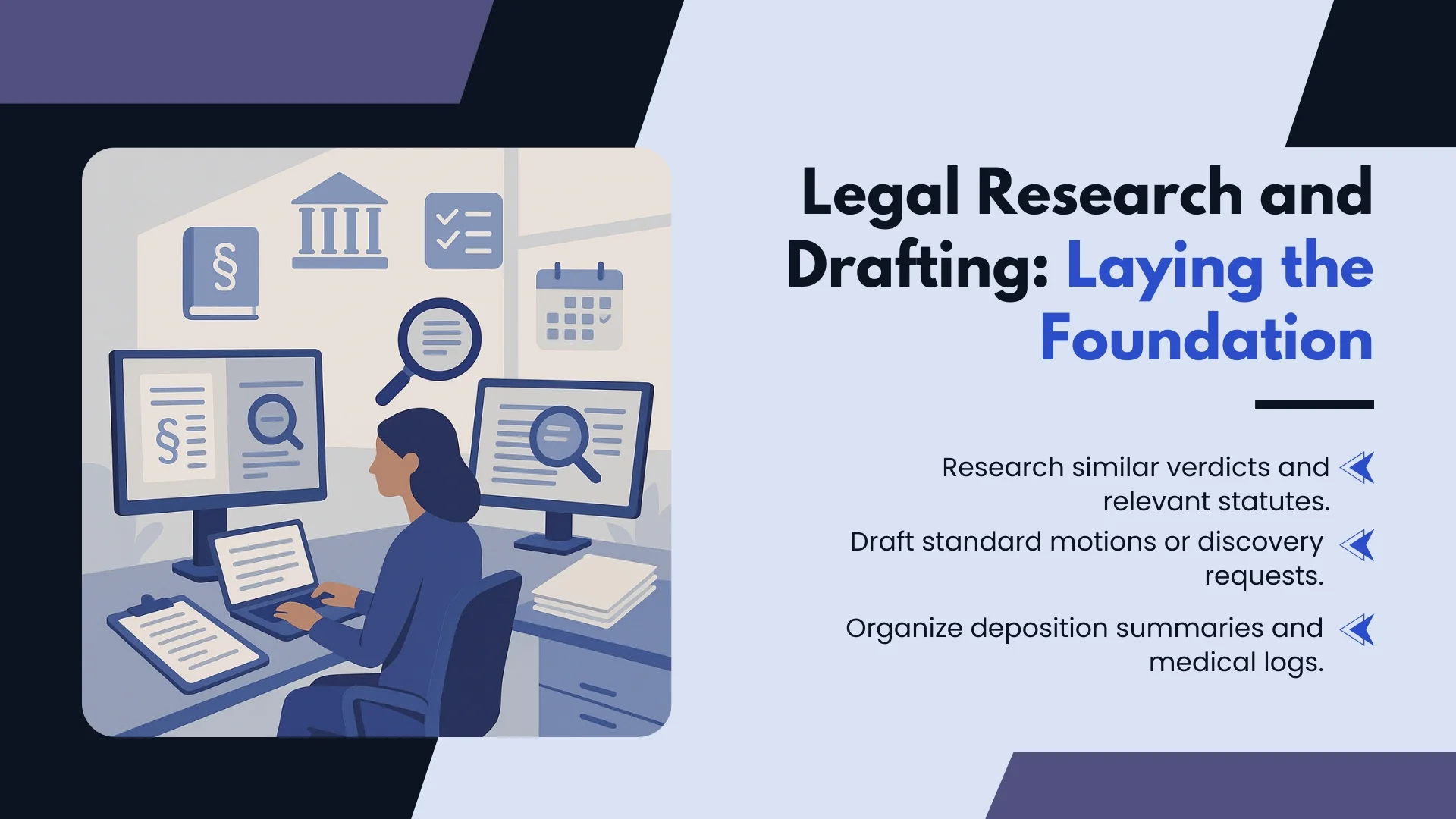
Settlement Prep and Billing: Accuracy and Speed
Settlement negotiations often come down to the quality of your demand package and your responsiveness. On the business side, billing accuracy is just as important.
Virtual assistants can:
- Prepare medical summaries and economic damages breakdowns.
- Track settlement negotiations and adjuster correspondence.
- Create invoices based on hours, milestones or contingency terms and send them to clients.
- Monitor payment status and follow up regarding due payments.
This reduces revenue leakage and increases your negotiating power.
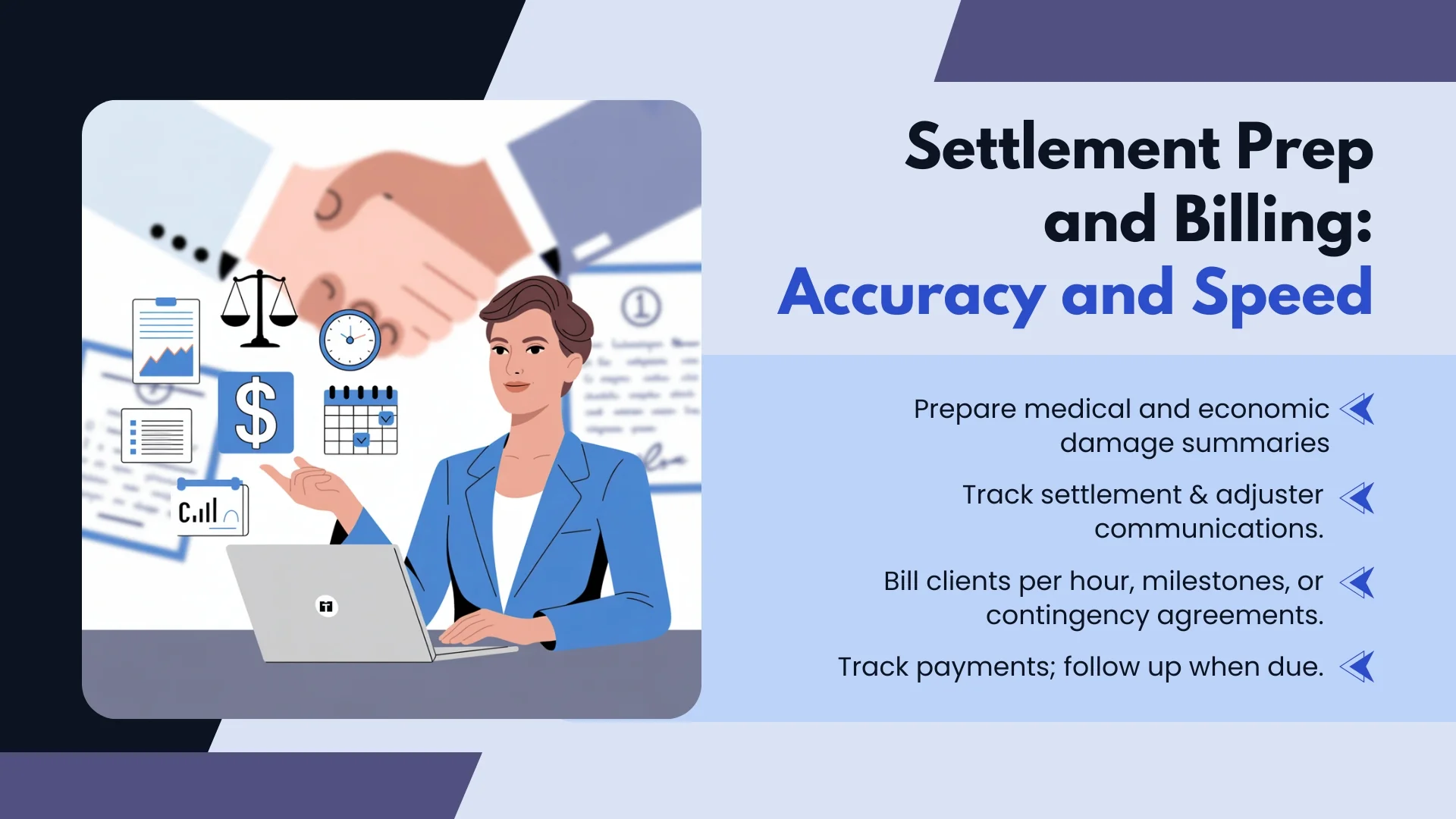
Why Hiring a VA Makes Sense
- Cost-effective: VAs are half the cost of a full-time paralegal or office manager.
- Scalable: Bring in more help during trial periods or scale down during slow periods.
- Reduced burnout: Free your legal team from the loads of administrative tasks so they can focus on high-value legal work.
- Faster turnaround times: VAs manage the flow and help you to reduce unnecessary delays.
- More personal time: Attorneys get their evenings and weekends back by outsourcing routine work.
When to Hire a Virtual Assistant?
If you’re wondering if it is really the right time to hire an additional help, ask yourself:
- Are client calls going unanswered during busy periods?
- Are case deadlines getting missed too often?
- Is your support staff feeling overwhelmed due to multitasking with workloads beyond their expertise?
- Do you have to spend more time managing logistics than litigating?
If the answer is yes for most of the above questions, it’s the right time to hire.
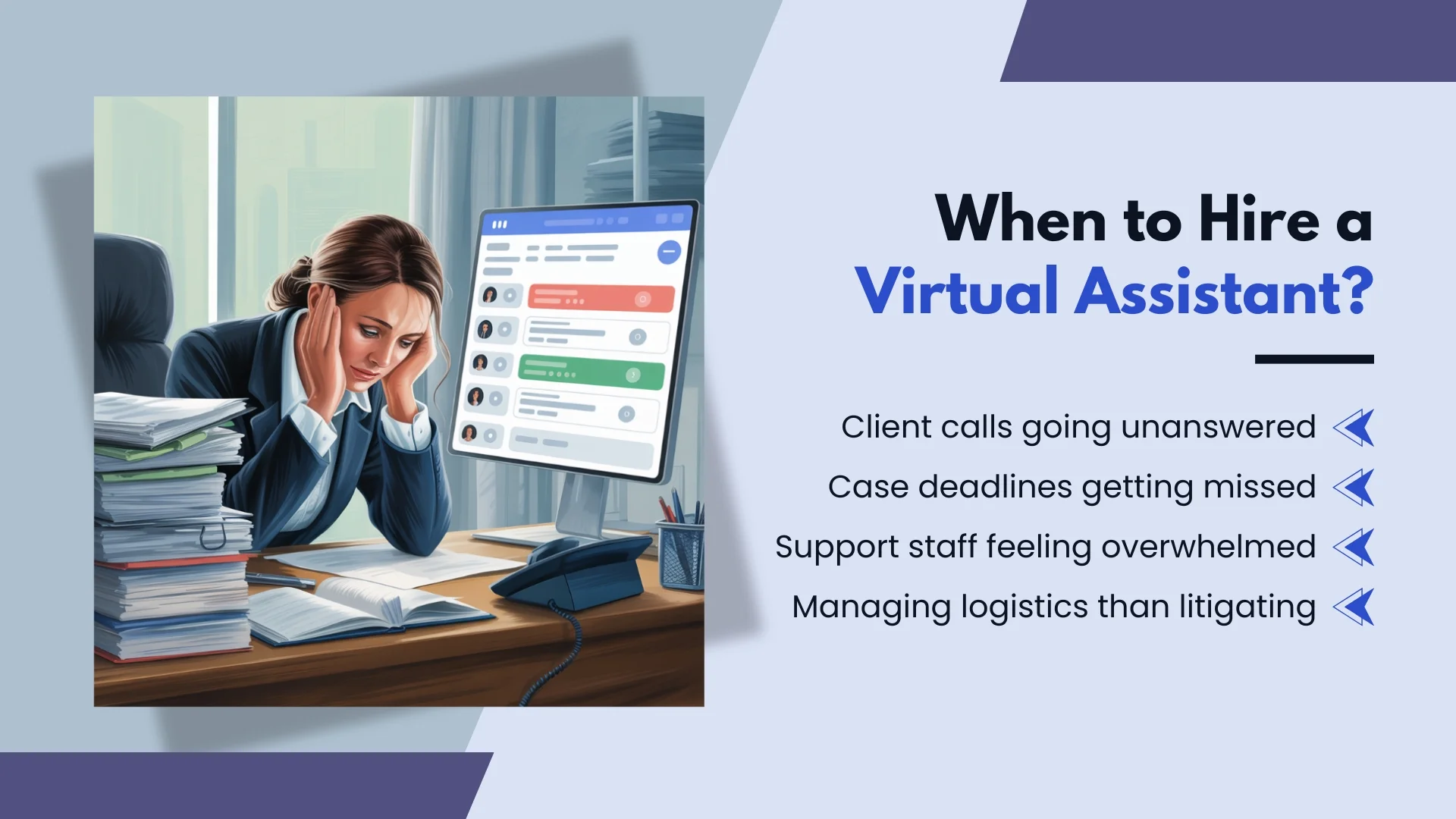
How to Hire the Right Virtual Assistant for Your Law Practice
Define the Role
Specify what you want the VA to handle: intake, billing, research, document management or all of the above.
Where to Hire From
Choose from:
- Freelancer platforms like Fiverr or Upwork
- Dedicated VA agencies like MyTasker (for legal-specific needs)
- Referrals from your network
Run a Pilot Test
Assign a 3-day or 1-week trial with clear objectives. Check quality, reliability as well as communication.
Secure Confidentiality
Check to confirm if they use NDAs, HIPAA compliant softwares and encrypted communication to protect client data.
Build Processes for Success
Check to confirm if they use tools like Trello or Slack for task management.
Screen for Legal experience and knowledge
Check their experience in using legal software as well as understanding of the personal injury process and legal terminology.
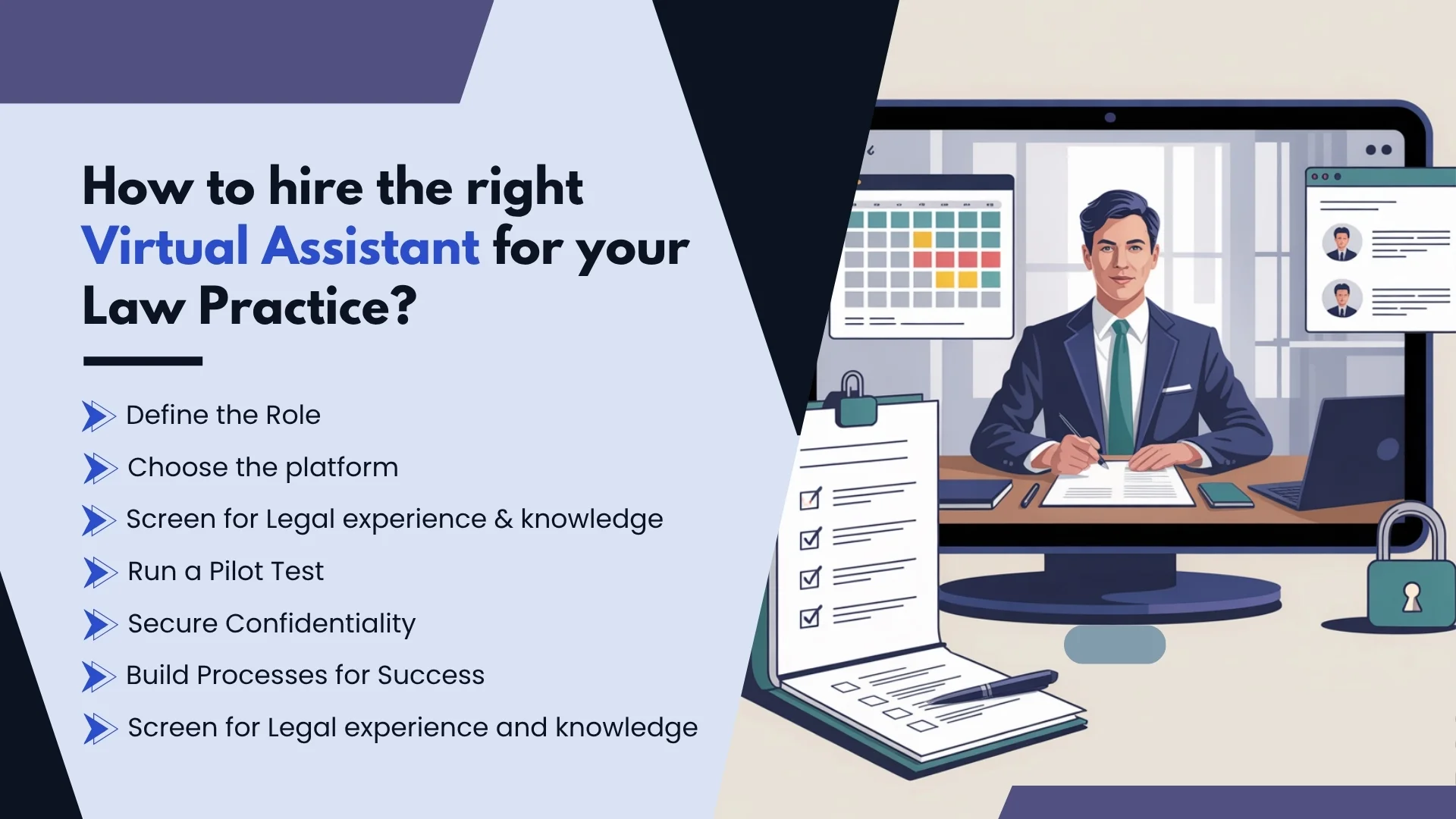
Frequently Asked Questions (FAQs)
- Is a virtual assistant the same as a paralegal?
No, although VAs can be able to handle some tasks like a paralegal. VAs handle many administrative tasks however, if they are not legally certified, they can’t provide legal advice or sign pleadings. - Can a VA interact directly with my clients?
Yes—many legal VAs are trained in professional client communication from intake to updates. - How do I protect clients’ confidential data with a remote assistant?
Check to confirm if they use secure tools, enforce NDA agreements and work only with VAs familiar with legal privacy standards. - Will training a VA take too much time?
Not if you document your workflows. Most experienced legal VAs can start working for you quickly with checklists, SOPs and a bit of guidance. - Are VAs reliable for time-sensitive legal work?
Yes, especially when you integrate them into your case management system and outline your clear expectations. - Can I hire a VA just for a few hours a week?
Absolutely. Many law firms start with 10-20 hours a month and upgrade or downgrade as needed. - What if I need both human and AI help?
That’s the trend of the future. Many firms use AI tools (like ChatGPT for faster composition and summaries) alongside human VAs for sharper and insightful communication.
Conclusion: From Time-Strapped to Time-Smart
The most successful personal injury lawyers aren’t doing it all themselves. They’re building smart systems. Virtual assistants are no longer a luxury—they’re a necessity for firms looking to grow, serve clients better and have a work-life balance.
So the question isn’t “Can I afford to hire a VA?”
It’s: Can you afford not to?
